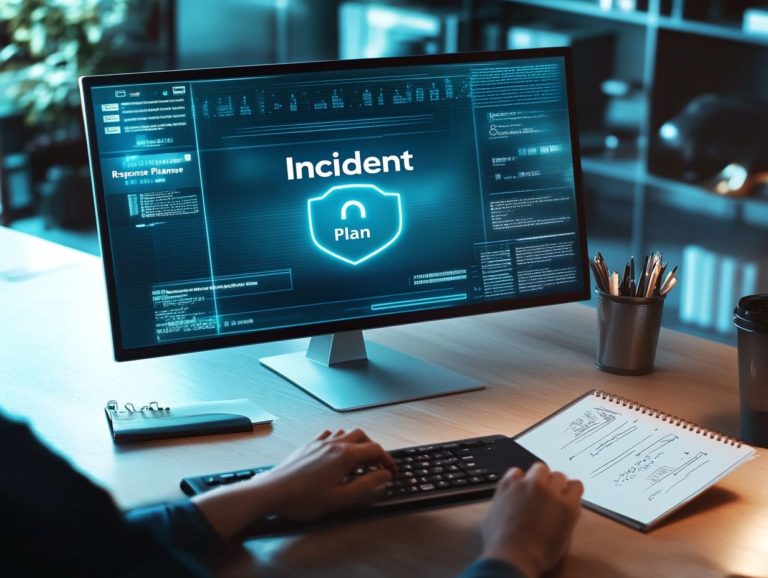evaluating third-party incident response services
In today s digital landscape, cyber threats loom large. Effective incident response is essential for any organization.
Utilizing third-party incident response services can be pivotal in protecting your business from potential disasters.
This article delves into what these services encompass, their benefits, and the critical factors to consider when assessing potential providers.
By grasping the key questions to ask and weighing the pros and cons, you ll be well-prepared to make a decision that aligns seamlessly with your organization s needs.
Contents
- Key Takeaways:
- Understanding Third-Party Incident Response Services
- Benefits of Using Third-Party Incident Response Services
- Factors to Consider When Evaluating Third-Party Incident Response Services
- Questions to Ask When Evaluating Third-Party Incident Response Services
- Making the Decision to Use Third-Party Incident Response Services
- Preguntas Frecuentes
- Cu l es el prop sito de evaluar los servicios de respuesta a incidentes de terceros?
- Qu factores debo considerar al evaluar los servicios de respuesta a incidentes de terceros?
- C mo puedo evaluar el tiempo de respuesta de un proveedor de servicios de respuesta a incidentes de terceros?
- Es importante considerar la experiencia y la pericia de un proveedor de servicios de respuesta a incidentes de terceros?
- C mo puedo evaluar la reputaci n de un proveedor de servicios de respuesta a incidentes de terceros?
- Qu debo buscar en el costo de un servicio de respuesta a incidentes de terceros?
Key Takeaways:

Consider the cost-effectiveness and expertise of third-party incident response services as potential benefits for your organization.
When evaluating third-party incident response services, consider their reputation, experience, and services offered, along with factors like response time, cost, and contract terms. It’s also beneficial to understand how to choose the right incident response vendor for your needs.
Ask important questions such as their approach to incident response, data security measures, and availability for emergency response before making a decision to use third-party services.
Understanding Third-Party Incident Response Services
Understanding Third-Party Incident Response Services is vital. Recognizing their value helps enhance your incident response capabilities, especially when considering how managed security services enhance incident response.
With data breaches unauthorized access to sensitive information becoming alarmingly frequent, it’s crucial to partner with third-party vendors for effective incident management.
These services offer structured methodologies for incident classification, risk assessment, and effective remediation guidance. They ensure compliance with vital regulatory frameworks like NIST, HIPAA, GDPR, and CCPA.
As you face potential operational disruptions, cultivating strong relationships with expert vendors is essential for maintaining a robust security posture and ensuring business continuity in an ever-evolving threat landscape.
What are Third-Party Incident Response Services?
Third-party incident response services are specialized solutions designed to help you manage and mitigate the impact of cybersecurity incidents effectively.
These services include a range of functions, from real-time monitoring to forensic investigation and tailored remediation strategies that address your specific vulnerabilities.
They leverage advanced methodologies and deploy teams of experts who utilize threat intelligence and analytics to swiftly identify the nature of any attack.
With an emphasis on rapid response times, these firms efficiently contain breaches, significantly minimizing potential damage.
They also help with long-term risk management by analyzing incidents to fortify your organization s security posture, ensuring that both immediate and future threats are comprehensively addressed.
Benefits of Using Third-Party Incident Response Services
Utilizing third-party incident response services brings numerous benefits to your organization, from cost-effectiveness to specialized expertise and improved risk mitigation capabilities.
Partnering with expert service providers is your key to staying ahead of cyber threats! You gain access to a wealth of knowledge that enables you to navigate the complex world of cybersecurity threats and compliance requirements.
These services not only simplify your vendor management processes but also ensure adherence to regulatory guidelines, safeguarding your critical data assets and fortifying your security posture.
Cost-Effectiveness and Expertise
One of the standout benefits of utilizing third-party incident response services is their remarkable cost-effectiveness. This approach allows you to tap into expert cybersecurity resources without the hefty price tag of extensive in-house investments.
These specialized services bring invaluable experience and knowledge something that’s often tough to cultivate internally, especially in a rapidly changing threat landscape.
By partnering with these providers, you gain access to their strategic insights while lightening the financial load that typically comes with maintaining a comprehensive internal team.
This efficient use of resources means you can redirect your focus toward core functions while ensuring robust incident management and thorough risk assessments.
Ultimately, harnessing such expertise reduces the likelihood of costly breaches and significantly enhances your overall security posture.
Factors to Consider When Evaluating Third-Party Incident Response Services

When evaluating third-party incident response services, consider several critical factors.
Focus on the vendor s reputation in the industry, their experience with various security incidents, and the range of services they provide. Also, consider their response times to incidents.
By thoroughly assessing these elements, you can build effective vendor relationships and choose a service provider that aligns with your risk management and compliance requirements.
Reputation and Experience
The reputation and experience of a third-party incident response provider are key indicators of their ability to manage security incidents effectively, especially when considering the managed security services and incident response synergy.
When assessing a vendor’s reputation, review feedback from past clients. This helps you gauge satisfaction and the provider’s responsiveness during critical moments.
Certifications can also indicate adherence to industry standards and best practices.
Check past case studies for important insights into how the provider has navigated similar incidents. This reveals their problem-solving strategies and outcomes.
A vendor’s experience in handling comparable situations enhances their risk management capabilities. Seasoned providers are typically better at anticipating challenges and implementing effective solutions, ultimately strengthening your overall security.
Services Offered and Response Time
Evaluating the range of services offered by a third-party incident response provider and their response times is crucial for meeting your organization’s specific needs, especially when considering how to evaluate your incident response strategy during a security incident.
These services generally include:
- Incident investigation, where experts analyze the breach to assess its scope, cause, and impact.
- Checks to find weak spots in your systems, helping you identify existing vulnerabilities before they can be exploited.
- Remediation guidance, offering a clear approach to restoring your systems and enhancing future security measures.
Quick response times are essential, as they can reduce the potential fallout from a breach, minimizing financial losses and operational disruptions while boosting confidence in your crisis management capabilities.
Cost and Contract Terms
When engaging a third-party incident response service, understanding the cost structure and contract terms is essential for managing your organization s financial risks.
Pricing models can vary, with options such as hourly rates based on time spent or retainer fees for a set amount of services over a fixed period. Each model has its own advantages, so assess your organization s needs against these choices.
Clear contract terms detail responsibilities and expectations, including breach notifications that specify actions in case of non-compliance.
Meticulously review service level agreements to ensure the provider meets expected response times and quality standards, safeguarding your interests during critical incidents.
Questions to Ask When Evaluating Third-Party Incident Response Services
Evaluating third-party incident response services? It’s time to ask the right questions!
This approach helps you determine which provider aligns best with your specific needs, ensuring that both data security and incident management support your operational goals.
In conclusion, selecting the right third-party service is vital. It can significantly impact your security posture and the effectiveness of your incident response.
What is Your Approach to Incident Response?

Understanding a vendor’s approach to incident response is crucial for evaluating their effectiveness and how well they align with your organization’s risk management strategy.
You should closely examine how the vendor categorizes incidents and assesses the risks tied to those events. This involves looking at their classification criteria, which should not only meet industry standards but also align with your specific organizational requirements.
A comprehensive grasp of their risk assessment process is essential, as it sheds light on how they prioritize threats and potential vulnerabilities. Their incident handling strategies ought to reveal a structured and efficient response to various scenarios.
By ensuring these practices resonate with your operational needs, you can cultivate a more resilient partnership while bolstering your overall security posture.
How Do You Ensure Confidentiality and Security of Data?
Inquiring about how a third-party incident response provider safeguards the confidentiality and security of your data is essential for maintaining compliance with regulatory guidelines and protecting sensitive information.
To effectively address these concerns, ensure that vendors use strong encryption methods to protect data both at rest and in transit.
Establishing stringent access controls is crucial, as it ensures that only authorized personnel can access sensitive information. This significantly reduces the risk of unauthorized access.
Compliance with regulations like GDPR and CCPA is crucial. These measures not only enhance data protection but also bolster the overall effectiveness of incident response.
By integrating these security protocols, vendors can manage incidents swiftly and efficiently, minimizing potential damage and fostering trust with you as a client.
What is Your Availability for Emergency Response?
Your organization needs to know if a third-party provider can respond quickly during emergencies. Assessing availability for emergency situations is essential for ensuring timely action during a security incident.
This evaluation goes beyond simply understanding their standard response times; it requires a deep dive into the steps to quickly respond in emergencies.
Any delays in response can magnify the impact of an incident, resulting in extended operational disruptions and financial losses. By prioritizing a vendor’s availability, you can significantly enhance your organization’s resilience.
A dependable partner who can mobilize quickly and efficiently is truly invaluable. Understanding how escalation is managed helps coordinate response efforts, ensuring that all parties are prepared to act decisively.
Making the Decision to Use Third-Party Incident Response Services
Choosing to work with third-party incident response services is a crucial decision for your organization. It requires a thoughtful evaluation of the advantages and disadvantages, along with a thorough assessment of your specific needs and available resources, including how to leverage external expertise for incident response.
This careful consideration will ensure that you make the most informed choice for your unique situation.
Evaluating the Pros and Cons
Evaluating the pros and cons of using third-party incident response services is crucial for your organization to grasp the potential benefits and drawbacks of this approach, including how to assess incident response readiness.
- Access to specialized expertise that might not be available in-house.
- Significant cost savings.
- Quicker incident resolution and improved preparedness for future threats.
However, relying on these services also brings its own set of challenges:
- Concerns about data security.
- The risk of misalignment with your internal protocols.
Balancing these factors is essential, as they play a significant role in shaping effective risk management strategies that help your organization navigate the complexities of cybersecurity.
Make sure to assess these factors today to secure your organization’s future!
Considering Your Organization’s Needs and Resources

Know what your organization needs and what resources are available when deciding whether to engage third-party incident response services. This requires a comprehensive assessment of your current internal capabilities.
Evaluate existing protocols, personnel skills, and technological infrastructures. By identifying both strengths and weaknesses, you can uncover critical gaps in your incident response plans.
Ensuring that vendor relationships align with your operational goals and risk management strategies will help external support enhance your internal efforts. This leads to a more unified response during incidents.
An integrated approach boosts the effectiveness of your response mechanisms and encourages collaboration between your internal teams and external partners, ultimately strengthening your resilience against potential threats.
Preguntas Frecuentes
Cu l es el prop sito de evaluar los servicios de respuesta a incidentes de terceros?
El prop sito de evaluar los servicios de respuesta a incidentes de terceros es garantizar que su organizaci n cuente con un medio confiable y efectivo para responder a incidentes de seguridad. Esto le permite evaluar las capacidades y calificaciones de diferentes proveedores de servicios para determinar cu l satisface mejor sus necesidades.
Qu factores debo considerar al evaluar los servicios de respuesta a incidentes de terceros?
Al evaluar los servicios de respuesta a incidentes de terceros, debe considerar factores como su tiempo de respuesta, experiencia y pericia, reputaci n, costo, y nivel de personalizaci n y flexibilidad en sus servicios. Es importante elegir un proveedor de servicios que pueda adaptarse a las necesidades nicas de su organizaci n y que tenga un historial comprobado de xito.
C mo puedo evaluar el tiempo de respuesta de un proveedor de servicios de respuesta a incidentes de terceros?
Para evaluar el tiempo de respuesta de un proveedor de servicios de respuesta a incidentes de terceros, puede preguntar por su tiempo promedio de respuesta en incidentes anteriores, sus protocolos para manejar incidentes urgentes, y cualquier garant a o Acuerdo de Nivel de Servicio (SLA) que ofrezcan.
Adem s, puede solicitar referencias de sus clientes anteriores para tener una mejor comprensi n de su tiempo de respuesta.
Es importante considerar la experiencia y la pericia de un proveedor de servicios de respuesta a incidentes de terceros?
S , es crucial considerar la experiencia y la pericia de un proveedor de servicios de respuesta a incidentes de terceros. El proveedor debe contar con un equipo de profesionales calificados con experiencia en el manejo de diversos tipos de incidentes de seguridad.
Tambi n deben tener una comprensi n profunda de las ltimas amenazas de seguridad y las mejores pr cticas para mitigarlas.
C mo puedo evaluar la reputaci n de un proveedor de servicios de respuesta a incidentes de terceros?
Para evaluar la reputaci n de un proveedor de servicios de respuesta a incidentes de terceros, puede leer rese as en l nea, pedir referencias de sus clientes anteriores, y investigar su historial de xito. Adem s, puede preguntar sobre certificaciones o premios que hayan recibido, ya que estos pueden ser indicadores de su credibilidad y confiabilidad.
Qu debo buscar en el costo de un servicio de respuesta a incidentes de terceros?
Al considerar el costo de un servicio de respuesta a incidentes de terceros, debe asegurarse de que est obteniendo un paquete completo y personalizado que satisfaga las necesidades de su organizaci n. El costo debe ser razonable y proporcionar valor por su dinero, en lugar de ser simplemente la opci n m s barata.
Tambi n es importante aclarar cualquier tarifa o cargo adicional que pueda incurrirse durante una respuesta a incidentes.






